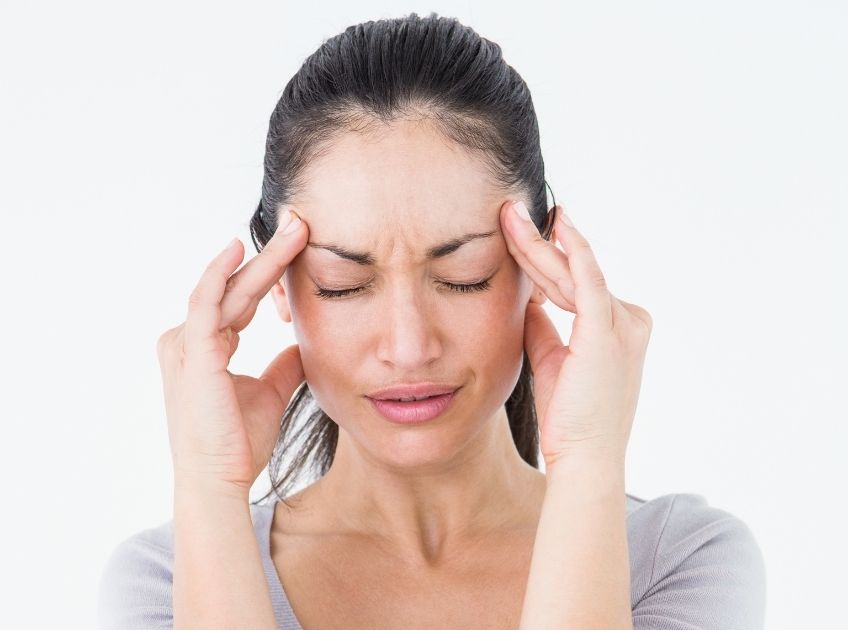
Important: This article is for informational purposes only. Please read our full disclaimer for more details.
Migraines are more than just headaches. They often come with throbbing pain, nausea, light sensitivity, and even visual disturbances. While medications are essential for many people, herbal teas can offer gentle, natural relief and help calm the nervous system, reduce inflammation, and ease tension—three major triggers behind migraine attacks.
Teas have been used for centuries in traditional medicine systems to treat pain and stress-related issues. Modern research also suggests that certain herbs may help reduce the severity or frequency of migraines when included as part of a holistic routine.
Top 7 Teas That May Ease Migraine Pain
1. Ginger Tea
Ginger is one of the most researched natural remedies for migraines. It helps reduce inflammation, relax blood vessels, and relieve nausea—one of the most common migraine symptoms. A small clinical study found ginger to be as effective as sumatriptan (a migraine medication) for reducing migraine severity in some individuals. Its warming nature also helps soothe tension headaches (1).
2. Peppermint Tea
Peppermint contains menthol, which has muscle-relaxing and cooling effects. It can help calm tension headaches, sinus-related migraines, and stress-triggered pain. Inhaling peppermint steam or drinking peppermint tea may reduce the intensity of headaches and relax tight neck muscles.
3. Chamomile Tea
Chamomile is well-known for its calming properties. It helps reduce stress and anxiety—two major migraine triggers. Chamomile’s anti-inflammatory flavonoids may also help ease nerve irritation and promote relaxation, making migraines less severe. It’s especially effective as a bedtime tea for those whose migraines worsen with poor sleep.
4. Green Tea
Green tea contains caffeine in moderate amounts, which can help constrict blood vessels and reduce migraine pain. It also has powerful antioxidants like catechins, which reduce inflammation and oxidative stress. For people sensitive to high caffeine levels, green tea offers a gentle alternative to coffee.
5. Feverfew Tea
Feverfew is one of the most studied herbal remedies for migraine prevention. It contains parthenolide, a compound believed to reduce muscle spasms and prevent the widening of blood vessels in the head—a known migraine trigger. Drinking feverfew tea regularly may help reduce migraine frequency over time.
6. Lavender Tea
Lavender is commonly used for relaxation and anxiety relief. Its soothing aroma and anti-inflammatory properties can help calm the nervous system and reduce migraine-related stress. Some studies show lavender aromatherapy significantly reduces migraine pain, and the tea version provides similar calming benefits (2).
7. Willow Bark Tea
Often called “nature’s aspirin,” willow bark contains salicin, which the body converts into salicylic acid. This gives it mild pain-relieving properties helpful for headaches or migraine-related tension. It works best for mild to moderate pain and may help when migraines are triggered by muscular tension.
Risks, Side Effects & Smart Use Tips
While herbal teas are natural, they should be used wisely—especially for people with neurological or cardiovascular conditions.
Potential Risks to be Aware of:
- Allergies: Feverfew and chamomile may cause reactions in people allergic to ragweed, daisies, or chrysanthemums.
- Caffeine sensitivity: Green tea may worsen migraines in individuals sensitive to caffeine.
- Digestive issues: Ginger or peppermint can irritate the stomach if consumed excessively.
Medication Interactions:
- Willow bark can interact with blood thinners.
- Feverfew should not be taken with migraine medications containing triptans unless advised by a doctor.
- Pregnancy: Feverfew and peppermint are not recommended during pregnancy.
Tips for Safe Use
- Start with small amounts and increase gradually.
- Avoid adding sugar—opt for honey only if necessary.
- Drink at the first sign of a migraine for better results.
- Maintain good hydration throughout the day.
What Research Says About Tea for Migraine Relief
Scientific evidence supporting natural migraine relief is growing:
- Ginger: Studies published in neurology journals suggest ginger powder is comparable to sumatriptan in reducing acute migraine pain (1).
- Peppermint: Research shows menthol can significantly reduce headache intensity when applied topically or consumed as tea (3).
- Feverfew: Clinical trials indicate feverfew may reduce migraine frequency, especially with long-term use (4).
- Green tea: Its moderate caffeine content and antioxidants help reduce inflammation-related headaches (5).
- Lavender: Studies on lavender aromatherapy show reduced pain intensity during migraine attacks (2).
Although teas cannot replace medications for severe migraines, they provide a gentle, supportive therapy with fewer side effects.
Frequently Asked Questions (FAQ’S)
1. Can tea completely stop a migraine?
A. Not always. Tea may help ease symptoms or reduce frequency, but severe migraines often require medical treatment.
2. When is the best time to drink tea for migraine relief?
A. Ideally, at the earliest sign of migraine, such as aura, neck tightness, or nausea. Regular use of certain teas (like feverfew or chamomile) may also help with prevention.
3. Can people with chronic migraines drink caffeinated tea?
A. It depends. For some, caffeine helps relieve pain; for others, it triggers migraines. Monitor how your body responds.
Herbal teas offer a soothing, natural approach to migraine relief. From the anti-inflammatory power of ginger to the calming benefits of chamomile and lavender, these teas can help reduce pain, ease tension, and support relaxation. While they aren’t a replacement for medical treatment, they can complement migraine management and provide gentle, effective support.















